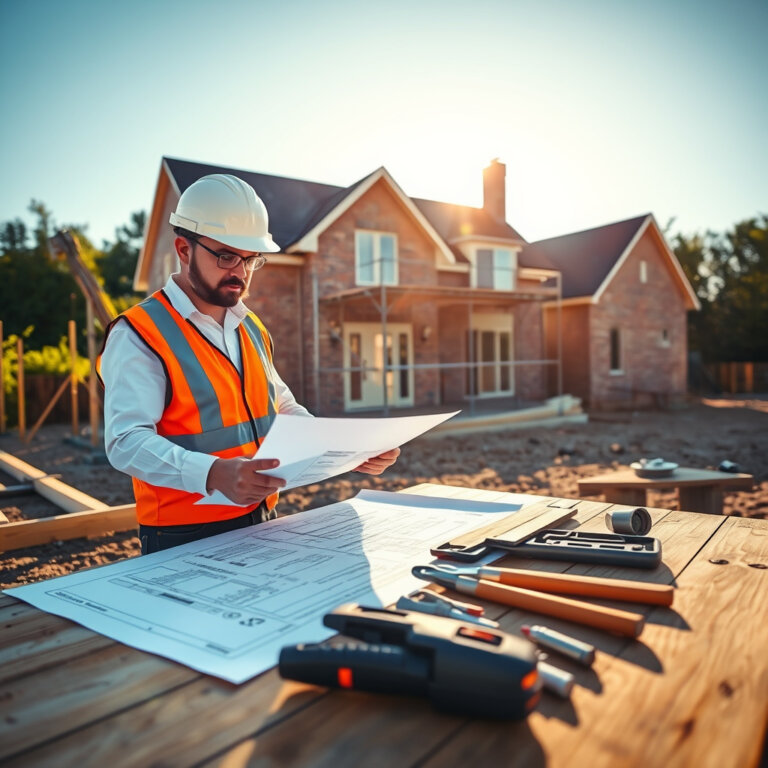Home construction management Massachusetts involves planning, coordinating, and overseeing residential construction projects in the state.
Are you a homeowner or real estate investor in Massachusetts thinking about construction or renovation?
Home construction management Massachusetts is crucial for navigating the complexities of building projects, from hiring reliable contractors to ensuring compliance with local regulations.
In this post, you’ll discover essential tips, cost breakdowns, and the permitting processes necessary to make your project a success.
Stay tuned to learn how effective management can save you time and money!
Essential Steps for Planning Your Construction Project
Planning a construction project can feel like a daunting task, but with the right approach, it becomes manageable and even exciting. Whether you’re considering a home addition permit in Boston, MA, or diving into a full-scale renovation, understanding the essential steps can set you on the path to success.
Define Your Goals and Budget
The first step in any construction project is to clearly define your goals. Ask yourself what you want to achieve. Are you looking to expand your living space, modernize your kitchen, or perhaps enhance your home’s exterior? Once you’ve outlined your objectives, it’s crucial to establish a budget. This budget should not only cover construction costs but also account for permits, design fees, and unexpected expenses. Home renovation cost guides in Massachusetts can provide valuable insights into what to expect financially.
Research and Select Your Team
With your goals and budget in hand, it’s time to research potential contractors. Look for licensed contractors in Massachusetts who specialize in your type of project. Reading reviews and asking for recommendations can help you find the best fit. Consider reaching out to home renovation contractors near me to gather quotes and establish rapport. It’s beneficial to interview multiple candidates to understand their approach and expertise.
Understand the Permitting Process
Before breaking ground, familiarize yourself with the local permitting process. For instance, if you’re planning a home addition in Boston, MA, you’ll need to apply for the appropriate permits. Knowing how to apply for a building permit can save you time and hassle. Make sure your contractor is well-versed in local regulations to ensure compliance.
Create a Detailed Project Timeline
After selecting your contractor and securing the necessary permits, work together to create a detailed project timeline. This timeline should outline key milestones, from the initial design phase to project completion. Discuss potential delays that could arise, especially in areas like material availability. A well-planned timeline helps keep everyone on the same page and ensures that your project stays on track.
Stay Involved Throughout the Process
As the construction progresses, maintain regular communication with your contractor. Schedule periodic check-ins to discuss progress and address any concerns. Being involved not only helps you stay informed but also allows you to make timely decisions. If you’re considering a cost of kitchen remodel in Worcester, MA, for example, staying engaged will ensure the project aligns with your vision.
Prepare for the Final Walkthrough
Once the project nears completion, prepare for a final walkthrough with your contractor. This is your opportunity to review the work done and ensure everything meets your expectations. Don’t hesitate to ask questions or request adjustments. A thorough walkthrough can help you identify any last-minute changes before concluding the project.
Celebrate Your New Space
After the completion of your construction project, take the time to enjoy your newly renovated space. Whether you’ve added a cozy family room or transformed your kitchen into a culinary haven, celebrating your hard work and investment is essential. Remember, smart renovations can also enhance your home’s value, making it a worthwhile endeavor in the long run.
By following these essential steps, you can navigate the complexities of your construction project with confidence and ease. Whether you are updating your home or embarking on a larger renovation, having a clear plan will help you achieve your vision successfully.
Understanding the Permitting Process in Massachusetts
Navigating the permitting process in Massachusetts can feel overwhelming, especially for those embarking on a home construction journey. However, understanding the stages of this process can significantly ease your experience. Whether you’re planning a home addition in Boston, a kitchen remodel in Worcester, or any other renovation project, being well-informed is key.
Getting Started: Research and Preparation
Before diving into applications, it’s crucial to conduct thorough research. Familiarize yourself with local zoning laws and building codes, as these can vary significantly across municipalities. For instance, if you’re considering a home addition permit in Boston MA, check the specific requirements and restrictions that apply to your neighborhood. This step ensures that your project aligns with local regulations, preventing potential delays later on.
Applying for Your Permit
Once you’ve gathered all necessary information, it’s time to apply for your permit. This process typically involves filling out forms specific to your project type. Knowing how to apply for a building permit can save you time and frustration. If you’re unsure, consulting with licensed contractors in Massachusetts can provide valuable guidance. They can help you navigate the paperwork and ensure that everything is completed accurately.
- Gather required documentation, such as site plans and project descriptions.
- Submit your application to the local building department.
- Pay any associated fees, which can vary depending on your project scope.
Review Process and Inspections
After submitting your application, it enters a review phase. Local officials will assess your project to ensure it meets all regulations. This is an essential step, as it guarantees the safety and compliance of your construction work. Be prepared for potential requests for additional information or modifications to your plans.
Depending on the nature of your project, inspections may also be required at various stages. For example, if you are working with a licensed roofing contractor in Newton MA, they will likely coordinate inspections to ensure that all work meets safety standards.
Final Approval and Moving Forward
Once your permit is approved, you can begin your construction project. However, it’s essential to keep your permit visible on-site and adhere to any stipulations outlined in the approval. If you’re working on a kitchen remodel, for instance, staying compliant with local regulations can prevent costly setbacks.
As you move forward, maintaining clear communication with your contractor and local officials will help ensure a smooth process. Whether you’re looking for home improvement permits in Boston or exploring the cost of kitchen remodel in Worcester MA, having the right information at your fingertips will empower you throughout your renovation journey.
Remember that understanding the permitting process not only saves you time and stress but also sets the foundation for a successful project. By being proactive and informed, you’ll be well on your way to bringing your vision to life in the vibrant communities of Massachusetts.
Choosing the Right Construction Management Provider
When embarking on a construction project, selecting the right construction management provider is crucial to ensure a smooth and successful process. With so many options available, it’s essential to approach this decision thoughtfully. Your choice can significantly impact the overall efficiency, quality, and cost of your project. Here’s how to navigate this important decision.
Assessing Your Project Needs
Before you start searching for a provider, take a moment to clearly define your project requirements. Consider the scope of your construction endeavor—are you planning a small renovation or a large-scale building project? Understanding the specifics will help you identify a provider with the right expertise. For example, if you’re looking at a home addition permit Boston MA, ensure the provider has experience in managing similar projects.
Researching Potential Providers
Once you have a clear understanding of your needs, begin researching potential construction management providers. Look for licensed contractors Massachusetts who have a solid reputation in the industry. Reading online reviews and asking for recommendations can provide valuable insights. Consider reaching out to previous clients to learn about their experiences. This step is vital, as it helps you gauge the reliability and quality of the provider’s work.
Evaluating Experience and Credentials
Not all construction management providers are created equal. When evaluating candidates, check their credentials and experience. A reputable provider should have a proven track record in managing projects similar to yours. Look for qualifications that demonstrate their capability, such as certifications and licenses. Engaging with a general contractor Massachusetts with extensive experience can make a significant difference in the success of your project.
Understanding Their Approach to Project Management
Every construction management provider will have a unique approach to handling projects. It’s essential to discuss how they plan to manage your project from start to finish. Ask about their communication strategies and how they handle unexpected challenges. A proactive provider should be able to demonstrate effective planning and risk management strategies, ensuring your project stays on track and within budget.
Discussing Budget and Costs
Budgeting is a critical aspect of any construction project. When you engage with potential providers, discuss their pricing structures and what services are included. Some might offer comprehensive packages, while others may have more basic options. Understanding the cost of kitchen remodel in Worcester MA or any other specific project costs will help you make an informed decision. Be sure to clarify any potential hidden fees that could arise during the project.
Checking for Proper Licensing and Insurance
Before making your final decision, verify that your chosen provider is fully licensed and insured. This step is crucial in protecting yourself and your investment. If any issues arise during the construction process, having a provider with the right credentials can safeguard against potential liabilities. An established provider will also typically have liability insurance, which is a reassuring factor to consider.
Building a Relationship
Establishing a good rapport with your construction management provider can significantly enhance the project experience. Open communication and mutual respect can foster a collaborative atmosphere, making it easier to address any concerns that may arise throughout the project. Look for a provider who values client relationships and is willing to work closely with you to achieve your vision.
Ultimately, choosing the right construction management provider is about finding a partner who aligns with your goals and can guide you through the complexities of your project. By taking the time to evaluate your options carefully, you can set the stage for a successful construction experience that meets your needs and exceeds your expectations.
Budgeting Tips for Home Renovation Projects
When embarking on a home renovation project, budgeting is often one of the most crucial aspects to consider. Whether you’re planning a small update or a major transformation, having a clear financial plan can save you from unexpected surprises down the line. Here are some practical tips to help you establish a budget that aligns with your renovation goals.
1. Set Clear Goals
Before diving into numbers, take a moment to outline what you want to achieve with your renovation. Are you looking to increase your home’s value, improve functionality, or simply refresh the aesthetics? By defining your goals, you can better allocate your budget and prioritize different elements of the project.
2. Research Costs
Understanding the cost of kitchen remodel in Worcester MA or the expenses associated with a home addition can provide a clearer picture of what to expect. Gathering estimates from home renovation contractors near me can help you gauge the average costs in your area. Don’t forget to account for materials, labor, and any permits you might need, such as a home addition permit Boston MA.
3. Create a Detailed Budget
Once you have a grasp of the costs, it’s time to create a detailed budget. Break down your expenses into categories, such as materials, labor, and contingency funds. A good rule of thumb is to set aside 10-20% of your total budget for unexpected costs. This way, you’ll be prepared for any surprises that may arise during the renovation.
- Materials: Flooring, fixtures, paint, etc.
- Labor: Costs for the licensed contractor Massachusetts or other professionals.
- Permits: Fees for necessary approvals, like how to apply for building permit.
- Contingency Fund: Reserve for unexpected expenses.
4. Prioritize Your Needs
With a detailed budget in hand, prioritize your renovation needs. Focus on the essentials that align with your goals. For instance, if your kitchen needs a complete overhaul, you might want to allocate more funds there while keeping other areas simpler. This strategic approach ensures that your budget is spent effectively.
5. Get Multiple Quotes
When hiring professionals, it’s wise to get multiple quotes. This not only helps you find the best price but also gives you insight into the different services offered by various general contractor Massachusetts. Check reviews and ask for recommendations to ensure you’re hiring someone who will deliver quality work without breaking your budget.
6. Monitor Expenses Closely
As your project progresses, keep a close eye on your spending. Tracking your expenses in real-time can help you identify areas where you may be overspending. If you find yourself exceeding your budget in one area, consider cutting back in another to stay on track.
7. Plan for Post-Renovation Costs
Finally, think beyond the renovation itself. There may be additional costs associated with maintenance or updates after the project is completed. For example, if you’ve added a new roof, you might want to hire a licensed roofing contractor Newton MA for ongoing maintenance. Including these potential costs in your budget will help you manage your finances more effectively.
These tips are designed to help you navigate the budgeting process with confidence. By planning carefully and making informed decisions, you can transform your space while staying within your financial limits. Remember, the right financial strategy not only ensures a successful renovation but also enhances the overall value of your home in the long run.
Navigating Zoning Laws and Regulations
When it comes to home construction management in Massachusetts, understanding zoning laws and regulations is crucial. These rules dictate what can be built where and are designed to ensure that development is orderly and beneficial to the community. Every municipality has its own set of zoning regulations, which can vary significantly from one area to another. This means that before you start your project, it’s essential to familiarize yourself with the specific zoning laws that apply to your property.
Understanding Zoning Categories
Zoning laws typically divide land into various categories, each with its own set of rules. Common categories include residential, commercial, industrial, and agricultural. Within these categories, there can be further distinctions, such as single-family versus multi-family residential zoning. Knowing these categories helps you determine what types of structures or renovations are permissible on your property. For instance, if you’re considering a home addition permit Boston MA, you’ll need to ensure that your plans align with the residential zoning requirements.
Researching Local Regulations
Researching local regulations is a vital step in navigating zoning laws. Start by visiting your city or town’s official website, where you can often find zoning maps and regulations. Many municipalities also hold public meetings or have planning departments that can provide guidance. Engaging with these resources not only helps you understand what is allowed but also prepares you for any necessary permits you might need, such as those for home improvement projects. If you’re unclear about the steps, consider reaching out to home renovation contractors near me who are familiar with local regulations and can help guide you through the process.
The Role of Permits
Permits are a key component of complying with zoning laws. Each construction project usually requires various permits, depending on its scope. For example, if you’re planning a kitchen remodel, you might need to apply for specific permits that ensure your project meets safety and zoning standards. Knowing how to apply for building permit in your locality will save you time and potential legal issues down the line. Always check what permits are required for your project before you begin, as failing to obtain the necessary approvals can lead to fines or even the halting of your project.
Consulting with Professionals
Working with a knowledgeable licensed contractor Massachusetts can be invaluable when navigating the complexities of zoning laws. They can help you interpret regulations and ensure your project complies with local codes. Additionally, a general contractor Massachusetts can assist you in understanding any potential obstacles you may face. Their expertise in local zoning can help streamline the permitting process and avoid costly delays.
Evaluating Your Options
As you assess your construction project, consider the implications of zoning laws on your plans. If your property is in an area with strict zoning regulations, you might need to adjust your designs. This could mean downsizing a proposed addition or changing the materials you plan to use. Being flexible and open to modifications can lead to a smoother process and ultimately a successful project. Utilize resources like a home renovation cost guide Massachusetts to understand the financial aspects involved in making such adjustments.
In conclusion, navigating zoning laws and regulations is an essential part of the home construction process. By understanding local laws, researching requirements, consulting with professionals, and staying flexible with your project plans, you can ensure a successful construction experience. Whether you’re considering a small renovation or a larger addition, being informed will empower you to make the best decisions for your home and community.
The Role of Technology in Modern Construction Management
In the evolving landscape of construction management, technology plays a pivotal role in enhancing efficiency, collaboration, and overall project success. Today, builders and renovation professionals are increasingly relying on innovative tools to streamline operations and improve communication across various stages of construction.
Streamlining Processes with Project Management Software
One of the most significant advancements in construction management is the rise of project management software. These platforms allow teams to plan, monitor, and execute projects with greater precision. With features such as task assignments, timelines, and budget tracking, project management software provides a centralized location for all project-related information. This transparency reduces miscommunication and ensures that everyone is on the same page.
- Enhanced Collaboration: Teams can collaborate in real-time, sharing updates and feedback instantly.
- Document Management: All necessary documents, from plans to permits, can be stored and accessed easily.
- Scheduling: Gantt charts and calendars help visualize project timelines, making it easier to manage deadlines.
Utilizing Building Information Modeling (BIM)
Building Information Modeling (BIM) is another transformative technology in modern construction management. BIM creates a digital representation of a building’s physical and functional characteristics, allowing contractors and architects to visualize the project before the first brick is laid. This proactive approach can significantly reduce errors and rework, ultimately saving time and costs.
- Design Visualization: Stakeholders can see a 3D model of the project, facilitating better decision-making.
- Clash Detection: BIM software can identify potential conflicts between different systems, such as plumbing and electrical, before construction begins.
- Cost Estimation: Accurate modeling helps to generate more reliable cost estimates, crucial for budgeting in projects like a cost of kitchen remodel in Worcester MA.
Embracing Mobile Technology
With the rise of mobile devices, construction professionals can now access vital information on-site, enhancing responsiveness and efficiency. Apps designed for construction management allow teams to communicate instantaneously, check project statuses, and update progress from anywhere. This immediacy is particularly beneficial when navigating the complexities of home renovation projects or when applying for necessary permits, such as a home addition permit Boston MA.
Data Analytics for Informed Decision-Making
In the present day, data analytics is becoming increasingly essential in construction management. By analyzing project data, managers can identify trends, forecast potential issues, and optimize resource allocation. This data-driven approach not only improves project outcomes but also aids in strategic planning for future endeavors, ensuring that construction services Massachusetts deliver value effectively.
The Importance of Integrating Technology with Skilled Labor
While technology enhances the efficiency of construction management, the expertise of a skilled workforce remains irreplaceable. The integration of technology with human skills allows for a more holistic approach to construction. For instance, relying on a licensed contractor Massachusetts who understands how to leverage these tools effectively can lead to greater project success. Home renovation contractors near me are increasingly expected to be tech-savvy, utilizing these advancements to improve their services.
In conclusion, the role of technology in modern construction management is undeniable. From project management software to mobile applications, these tools are reshaping how construction professionals approach their projects, ensuring that they meet the demands of today’s fast-paced environment. As the industry continues to innovate, embracing these technologies will be crucial for anyone looking to thrive in the realm of construction and renovation.
Environmental Considerations in Home Building
Understanding the Impact of Home Construction
As the demand for new homes continues to rise, it’s crucial to consider the environmental implications of home building. The construction process itself can have significant effects on the surrounding ecosystem, from land disruption to waste generation. Therefore, adopting sustainable practices is not just a trend, but a necessity for responsible builders and homeowners alike.
Sustainable Materials and Resources
When embarking on a home building project, selecting eco-friendly materials can make a considerable difference. Opting for sustainable resources, like bamboo flooring or recycled metal roofing, reduces the carbon footprint of the construction process. Additionally, using locally sourced materials minimizes transportation emissions and supports the local economy. Whether you are looking for a licensed contractor Massachusetts or a general contractor Massachusetts, ensure they prioritize sustainability in their offerings.
Energy Efficiency in Design
Designing a home with energy efficiency in mind can lead to long-term savings and a reduced environmental impact. Incorporating features such as high-performance insulation, energy-efficient windows, and renewable energy sources like solar panels can significantly lower energy consumption. This not only benefits the environment but can also increase the home’s value, making it a smart investment for future owners.
Water Conservation Strategies
Water management is another critical aspect of environmental considerations in home building. Implementing rainwater harvesting systems, low-flow fixtures, and drought-resistant landscaping can greatly reduce water waste. These practices not only contribute to a sustainable home but can also be beneficial in areas where water scarcity is a concern.
Waste Management and Recycling
Construction projects often generate substantial waste. To combat this issue, it is essential to have a waste management plan in place. Recycling materials like wood, metal, and concrete can divert waste from landfills and promote a circular economy. Collaborating with home renovation contractors near me who understand the importance of waste reduction can ensure your project is both eco-friendly and efficient.
Environmental Regulations and Permitting
Navigating the local regulations surrounding environmental impact is another crucial step in home construction. Many municipalities have specific requirements for sustainable building practices. Understanding these regulations, such as obtaining a home addition permit Boston MA, can help you avoid fines and ensure your project aligns with local sustainability goals.
The Role of Landscaping
Landscaping plays a pivotal role in enhancing a home’s environmental performance. Native plants require less water and maintenance, making them a sustainable choice for your garden. Additionally, incorporating green spaces can improve air quality and promote biodiversity, creating a healthier environment for both inhabitants and wildlife.
Community and Environmental Responsibility
Building a home is not just about creating a living space; it’s also about contributing to the community and the environment. Engaging with local organizations that focus on sustainability can enhance your project’s ecological impact. Moreover, adopting environmentally friendly practices fosters a sense of responsibility that resonates within the community, inspiring others to follow suit.
By integrating these environmental considerations into your home building project, you can create a space that is not only beautiful and functional but also sustainable and respectful of the natural world. This holistic approach to home construction reflects a commitment to both quality living and environmental stewardship. Whether you are exploring the cost of kitchen remodel in Worcester MA or looking for the best contractors for home additions MA, prioritize sustainable practices to make a meaningful impact on your community and the planet.
Post-Construction: Ensuring Quality and Safety
After the hard work of construction is completed, the focus shifts to ensuring that the new structure not only meets aesthetic standards but also adheres to safety regulations and quality assurance protocols. This phase is crucial in confirming that every detail aligns with the original vision while providing a secure environment for future occupants.
Quality Control Measures
Implementing effective quality control measures is essential during the post-construction phase. This includes thorough inspections to assess the integrity of materials and workmanship. A systematic approach to quality assurance will help identify any deficiencies that need addressing. Here are some aspects to consider:
- Material Inspection: Ensure that all materials used in the project comply with industry standards and specifications.
- Workmanship Review: Evaluate the craftsmanship on various elements, such as flooring, walls, and roofing, to confirm they meet the expected quality.
- Compliance Checks: Verify that the construction adheres to local building codes and regulations, which is particularly important in places like Massachusetts where regulations can be stringent.
Safety Protocols
Safety is paramount in any construction project. Conducting a comprehensive safety audit after the completion of construction is vital to ensure that the building is safe for occupancy. This includes:
- Fire Safety: Check that all fire safety measures, including alarms and extinguishers, are properly installed and functional.
- Structural Integrity: Engage a licensed contractor Massachusetts to assess the stability of the structure and identify any potential hazards.
- Emergency Exits: Ensure that all emergency exits are clearly marked and accessible, providing a safe route for evacuations if necessary.
Final Touches and Client Walkthrough
Once inspections are complete and any issues are resolved, it’s time for the final touches. This stage often includes landscaping, interior design elements, and other aesthetic improvements. Additionally, organizing a walkthrough with the client is crucial. During this meeting, the client can:
- Review the Work: Discuss any specific areas of concern and preferences that might still need addressing.
- Understand Maintenance: Gain insights into proper maintenance practices to ensure longevity and safety in the future.
- Receive Documentation: Obtain all necessary documentation, including warranties and manuals for installed systems.
Feedback and Adjustments
Gathering feedback after the construction is completed is invaluable. It allows contractors to understand the client’s satisfaction level and identify any areas for improvement. This feedback loop is particularly beneficial for home renovation contractors near me who aim to enhance their services continually. Based on the insights received, adjustments can be made to improve future projects and strengthen client relationships.
Post-Construction Services
Lastly, many general contractors Massachusetts offer post-construction services that ensure the property remains in excellent condition. These services can include routine maintenance checks, which help prevent future issues and keep the property safe and functional. By engaging with these services, homeowners can enjoy peace of mind, knowing that their investment is being protected.
In the competitive landscape of construction, ensuring quality and safety post-construction is not just a best practice; it’s a commitment to excellence that distinguishes top-tier contractors from the rest. For those considering improvements or expansions, understanding how to apply for a building permit, such as a home addition permit Boston MA, can facilitate the process and ensure compliance with local regulations.

At Builders RD, our editorial team is made up of construction professionals, researchers, and local content strategists who specialize in home improvement, permitting, and contractor services across Massachusetts. We work closely with industry experts, licensed contractors, and municipal guidelines to deliver accurate, actionable content that helps homeowners, investors, and builders make confident decisions.
Our mission is to simplify the construction process through trustworthy guidance — from permit applications to hiring the right team — so you can build smarter, safer, and with full peace of mind.
— Builders RD Editorial Team






